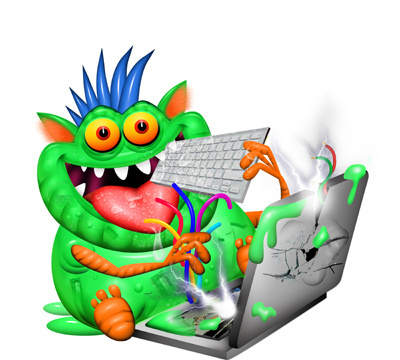
A computer virus – is a type of malicious software program (“malware”), which has a common feature to replicate by reproducing itself (copying its own code source) and able to be introduced into other program’s code, sections of system memory and boot sectors. This is a special program, mostly small-sized, which distributes its copies through various communication channels. Usually, this virus was programmed for the disruption of programs, blocking user’s activities, deleting files, rendering PC’s hardware to inoperable conditions.
Computer viruses can be classified as follows depending on its “habitat”:
- Boot viruses – viruses, which can sneak to the boot sector of storage devices, such as hard drives, USB flash drives, floppies, etc., and are able to destroy file access.
- File viruses – is a type of viruses, which sneaks to executable files (files with .COM and .EXE extension) and has had a negative impact on its functionality.
- File-bootable viruses – viruses, which unites the functions of the two previous types of viruses;
- Document viruses – is a type of viruses, which infect an office system files. This type also called as “macro viruses”, thus system infection performed through infection of program macros.
- Network viruses – is a type of viruses, which distributes through using a computer network, i.e. network services and protocols.
Also, viruses are divided into types according to the principle of its functioning – viruses-parasites, viruses-replicators, trojans, stealth-viruses, self-scrambling, mutating, “resting” viruses (was programmed to be activated at a certain time).
In order to detect, remove or protect your computer from viruses, there are developing special programs. These programs are called antiviruses and represent the multifunctional product that combines tools such as: preventive, prophylactic, “treatment” or deleting means and also to restore damaged or lost data.
Antivirus programs can be classified as follows:
- Programs-detectors – such, which help to find viruses in the operating system or at the media drives, at the same time these programs don’t treat such viruses.
- Doctor programs – programs, which unlike the previous type, not only can find a virus but are able to treat infected file, turning it into baseline condition.
- Programs-revisers – such programs tend to remember the file or system area of a disk in its baseline state and later compare the current state with the baseline. While comparing the file are take into account file parameters, so these programs don’t leave any chance to escape to this virus.
- Filter programs – created to detect suspicious activity on the computer. When attempting to activate the virus, the program can block its work.
- Vaccines – such programs, which directly prevent infecting of different files. It is necessary to apply for such a program if doctor programs do not exist. But remember that vaccination is only possible against already known viruses.
However, the presence of only one anti-virus on the workstation is not sufficient to protect system-wide and application software and must be supported by rational actions and cautions during the working process in the network of users.
Hire hackers with a difference, they specialize in all sorts of cyber and identity issues. if you need to disappear, contact this hacker. they can make anything happen and in time too. They provide other hacking services too. You can never put a price on real hackers but they are affordable too.
contact today: darkwebsolutions.co